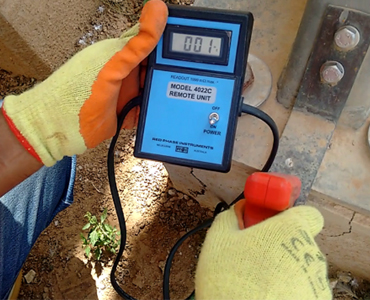We Provide Best Electrical Service.
Earthing Audit
Earthing Audit
An earthing audit is an assessment of the effectiveness and safety of the earthing system in a building or facility. The earthing system, also known as grounding, is crucial for electrical safety. It provides a low-resistance path for fault currents to flow safely into the ground, preventing electrical shocks and reducing the risk of fire.

Procedure of Earthing Audit:
During an earthing audit, qualified professionals typically inspect the earthing infrastructure, including ground rods, conductors, connections, and grounding electrodes. They may use specialized equipment to measure ground resistance, continuity, and impedance to ensure that the system meets safety standards and regulatory requirements.
The audit aims to identify any deficiencies or areas of improvement in the earthing system, such as corroded connections, inadequate grounding, or improper installation. Recommendations may be provided to address any issues found during the audit to enhance the safety and effectiveness of the earthing system.
In general, an Earthing Audit plays a crucial role in ensuring electrical safety and preventing hazards associated with faulty earthing systems. It helps to maintain compliance with relevant standards and regulations while minimizing the risk of electrical accidents.
Earthing Audit applications:
Earthing audits are essential for maintaining the safety, reliability, and compliance of electrical systems across various industries and applications.
Common applications of Earthing Audits:
- Industrial Facilities: Earthing audits are essential in industries such as manufacturing, petrochemicals, mining, and utilities. These audits ensure that the electrical grounding systems in these facilities comply with safety standards and effectively protect equipment and personnel from electrical faults.
- Commercial Buildings: Audits in commercial buildings, including offices, shopping centers, and hospitals, help ensure that the electrical systems are properly grounded to protect occupants and equipment from electrical hazards.
- Data Centers: Data centers rely heavily on stable electrical systems to ensure uninterrupted operation. Earthing audits in data centers are critical to maintaining system reliability, minimizing downtime, and protecting sensitive equipment from electrical surges.
- Telecommunication Infrastructure: Earthing audits are essential for telecommunication infrastructure, including cell towers, data transmission facilities, and communication networks. Proper grounding ensures signal integrity, protects equipment from lightning strikes, and minimizes interference.
- Renewable Energy Installations: Earthing audits are necessary for renewable energy installations such as wind farms and solar power plants. Proper grounding ensures the safety of personnel working on-site and protects expensive equipment from lightning strikes and other electrical disturbances.
- Transportation Systems: Earthing audits are essential for transportation systems, including railways, airports, and seaports. Proper grounding of electrical systems ensures the safety of passengers and employees and protects critical infrastructure from electrical faults.
- Hazardous Environments: In environments where the risk of electrical hazards is high, such as chemical plants or oil refineries, earthing audits are especially crucial. These audits help identify potential risks and ensure that grounding systems can effectively mitigate them.
- Compliance and Regulations: Many industries are subject to regulations and standards regarding electrical safety and grounding. Earthing audits help companies ensure compliance with these regulations and avoid potential fines or legal issues.
- Risk Assessment and Mitigation: Earthing audits also play a vital role in risk assessment and mitigation strategies. By identifying potential weaknesses or deficiencies in grounding systems, companies can take proactive measures to mitigate risks and prevent costly downtime or accidents.
